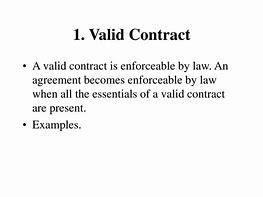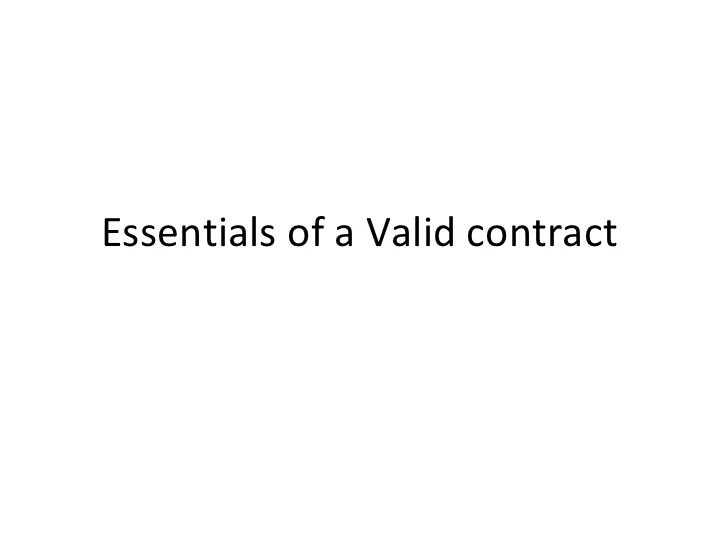What makes a Valid Contract?
Table of Contents
Introduction
A valid contract is the cornerstone of legal agreements, providing a solid framework for parties to engage in transactions and exchanges. It is a legally binding agreement that ensures the rights and obligations of the involved parties are recognized and enforced. A valid contract is formed when there is an offer, acceptance, consideration, mutual intention to create legal relations, and the capacity to contract. This introduction will explore the essential elements of a valid contract, its importance in various legal systems, and the requirements for its formation. Understanding the concept of a valid contract is vital for individuals and businesses alike, as it establishes trust, clarity, and accountability in the realm of commercial and personal transactions.
Meaning Of Valid Contract
A valid contract is defined under Section 2(h) of the Indian Contract Act,1872. According to this “an agreement enforceable by law” is a valid contract. It is a set if promises which gives rise to the obligations on the part of the parties entering into such a contract.
A valid contract is more than a casual understanding; it carries legal weight and ensures that parties are bound to fulfill their agreed-upon obligations. It provides a framework for businesses and individuals to engage in transactions with confidence and certainty, as the law recognizes and enforces the rights and responsibilities outlined in the contract.


Essential Elements of a Valid Contract
The following are the essentials of a valid contract: –
- Minimum Two parties
- Consensus ad idem
- Competent parties
- Legal Relationship
- Free Consent
- Lawful Consideration and Object
- Not declared to be void
- Certainity and possibility
- Legal Formality
Minimum Two Parties
In order for a contract to be considered valid, it is essential that there are a minimum of two parties involved. The agreement and its subsequent enforceability are contingent upon the presence of these parties. Let’s delve deeper into this requirement and understand its significance in the contract formation process.
Understanding the Involvement of Two Parties
- Mutual Obligations: A valid contract arises from the mutual consent and agreement between two distinct parties. Each party assumes certain rights and obligations as a result of their agreement. This ensures that there is a balance and reciprocity in the contractual relationship.
- Legal Relationships: By involving at least two parties, a contract establishes a legal relationship between them. This legal relationship forms the basis for their rights and obligations, providing a framework for their interactions and transactions.
- Exchange of Consideration: The presence of two parties allows for the exchange of consideration, which is an essential element of a valid contract. Consideration refers to the value or benefit that each party provides to the other as part of the agreement. It can be in the form of money, goods, services, or promises.
- Accountability and Enforcement: Having two parties involved in a contract ensures that both are held accountable for their respective promises and obligations. This allows for the contract to be legally enforceable, as there are clear rights and responsibilities assigned to each party.
Consensus ad idem
The Maxim ‘Consensus ad idem’ means meeting of the minds of both the parties about the subject matter in the same sense at the same time. If there is absence of consensus ad idem there can be no valid contract.
The maxim “Consensus ad idem” lies at the heart of contract formation, highlighting the significance of a meeting of minds between the parties involved. It signifies that both parties must have a mutual understanding and agreement regarding the subject matter of the contract, in the same sense and at the same time. Let’s explore the concept of consensus ad idem and its role in ensuring the validity of a contract.
The Essence of Consensus ad Idem
- Mutual Understanding: Consensus ad idem emphasizes the importance of mutual understanding between the parties. It implies that both parties should share a common understanding and interpretation of the terms and conditions of the contract. This mutual understanding ensures that there are no ambiguities or misunderstandings that could invalidate the contract.
- Meeting of Minds: A valid contract requires the parties to reach a meeting of minds on all essential elements of the contract. This includes the subject matter, rights, obligations, and any other key terms. It is essential that both parties are in agreement and have a clear understanding of what is being agreed upon.
- Same Sense and Same Time: Consensus ad idem necessitates that the parties reach this meeting of minds in the same sense and at the same time. It means that both parties must understand and interpret the contract’s terms in a similar manner, without any contradictory or conflicting interpretations.
Competent Parties
For a contract to be valid and legally enforceable, it is essential that the parties involved possess the necessary competence and adhere to the rules outlined in Section 11 of the Indian Contract Act of 1872. Let’s break down these rules in easy and simple language to ensure a clear understanding of party competency in contract formation.
Who Can Enter into a Contract?
To enter into a contract, the parties should meet the following criteria:
- Age Requirement: The parties must be considered “major,” which means they have reached the age of 18 years. Minors, individuals below the age of 18, are generally not competent to enter into contracts. However, there are exceptions for contracts related to necessities or those ratified upon reaching adulthood.
- Mental Capacity: It is crucial that the parties have a sound mind. This means they should be mentally capable of understanding the terms, rights, obligations, risks, and benefits associated with the contract. Any mental illness or incapacity that impairs their ability to comprehend may render them incompetent to enter into a contract.
- Compliance with Applicable Laws: Parties should not be disqualified from entering into a contract by any other laws that apply to them. This ensures that individuals engaged in certain professions or subject to specific regulations comply with the legal requirements for contracting.
Legal Relationship
When entering into a contract, it is vital for the parties involved to have the intention of creating a legal relationship with each other. This means that the contract should be made with the understanding that the parties will be bound by their obligations and will be held liable for any failure to perform those duties. Let’s explore the significance of a legal relationship in contracts, explained in simple and easy language.
The Intention of Creating a Legal Relationship
For a contract to be valid and enforceable, the parties must have the intention to create a legal relationship. This means that they should understand and acknowledge that the terms of the contract will be legally binding. Without this intention, the parties may not be held accountable for fulfilling their obligations under the contract.
Liability for Non-performance
When a contract is made with the intention of creating a legal relationship, the parties are legally obligated to fulfill their respective duties and responsibilities as outlined in the contract. If either party fails to perform their obligations as agreed upon, they may be held liable for breach of contract. This means that the non-performing party can face legal consequences and may be required to compensate the other party for any losses incurred.
Presumption of Legality
In most contractual agreements, there is a presumption of legality, meaning that the courts will generally assume that the parties intended to create a legal relationship. This presumption can be rebutted if there is clear evidence to the contrary, such as an agreement expressly stating that it is not legally binding or if the agreement involves illegal activities.
Case:- Balfour Vs Balfour
Facts of the case:
In the Balfour vs. Balfour, Mr. Balfour and Mrs. Balfour went to England for spending vacations, but Mrs. Balfour fell ill due to which she was unable to come back to his native country. Mr. Balfour while returning to his native country promised Mrs. Balfour that he will pay her maintenance but unfortunately, he failed to pay maintenance to Mrs. Balfour. Mrs. Balfour brought an action against Mr. Balfour for the breach of Contract.
Judgement of the case:
It was held that this contract was not valid as there was no intention to create a legal relationship between the parties.


Free Consent
When entering into an agreement, it is essential to ensure that the consent obtained from all parties involved is free consent. Free Consent is a crucial aspect of contract law, defined under Section 14 of the Indian Contract Act, 1872. It implies that the consent given by the parties should be voluntary and not influenced by any external factors such as coercion, undue influence, fraud, misrepresentation, or mistake. Let’s explore the concept of free consent in a simplified manner.
Voluntary and Uninfluenced Consent
Free consent refers to a voluntary and uninfluenced agreement between the parties involved. It means that the consent is given without any external pressure or manipulation. The consent should be a genuine expression of the party’s will and must not be obtained through force, threats, or any form of coercion.
Absence of Coercion
Coercion refers to the act of compelling someone to do something against their will. In the context of contracts, any agreement obtained through coercion is not considered as free consent. Coercion can involve physical force, threats, or even psychological pressure that undermines the party’s ability to make independent decisions.
Undue Influence
Undue influence occurs when one party takes advantage of their position of power or authority to influence the decision-making process of another party. In such cases, the consent obtained is not considered free, as it is influenced by the dominant party’s unfair advantage. To ensure free consent, both parties should have equal bargaining power and be able to freely negotiate the terms of the agreement.
Absence of Fraud and Misrepresentation
For consent to be considered free, it should not be obtained through fraud or misrepresentation. Fraud involves intentionally deceiving the other party by providing false information or concealing important facts. Misrepresentation, on the other hand, refers to the unintentional misrepresentation of facts. In both cases, the consent given based on inaccurate or misleading information is not considered free.
Mistake
Consent obtained through mistake is not free consent. Mistake can be either mutual or unilateral, and it refers to an erroneous understanding of the terms or subject matter of the contract. If a party enters into an agreement based on a mistaken belief, their consent may not be considered free.
Importance of Free Consent
The concept of free consent ensures fairness and integrity in contractual agreements. It protects individuals from entering into agreements under duress or deception. By requiring free consent, the law aims to uphold the principles of voluntariness and fairness, promoting trust and confidence in business transactions.
Lawful Consideration and Object
The object of the contract and the consideration so provided for the contract should be both lawful. The object and consideration are said to be unlawful when court regard it as immoral, or involves injury to person or property, or is forbidden by law, or would defeat the provisions of law, or is fraudulent in nature.
Not Declared to be Void
In the realm of contracts, ensuring their validity and legality is of utmost importance. A contract that is not declared void is one that adheres to the essential requirements of a valid contract and does not involve subject matters prohibited by the Indian Contract Act of 1872. Let’s delve into this topic using simple and straightforward language.
Void Contracts: Violation of Essentials
A contract is deemed void when it fails to meet one or more of the essential elements required for a valid contract. These essential elements include competent parties, free consent, consideration, a lawful object, and the presence of a legal relationship. If any of these elements are violated or missing, the contract is considered void and holds no legal weight.
Subject Matters Mentioned in Sections 24 to 30
Furthermore, a contract can be rendered void if it pertains to subject matters specified in Sections 24 to 30 of the Indian Contract Act, 1872. These sections outline certain situations where contracts are automatically deemed void. Subject matters such as agreements to restrain marriage, agreements in restraint of trade, and agreements involving unlawful consideration fall within this category. It is crucial to avoid entering into contracts related to these prohibited subject matters.
Importance of Avoiding Void Contracts
Understanding the concept of void contracts and actively avoiding them is vital to safeguarding one’s rights and interests. Void contracts lack legal enforceability, leaving the parties involved without legal remedies in case of disputes or breaches. By ensuring compliance with the essential elements of a valid contract and steering clear of prohibited subject matters, individuals and businesses can protect themselves from potential legal complications and maintain the integrity of their agreements.
Certainty and Possibility
When entering into a contract, it is crucial to ensure that the contract revolves around a certain and possible act or abstinence. Certainty and possibility play a significant role in determining the validity of a contract. Let’s explore this concept further in a human-like and unique manner.
Certainty: Avoiding Ambiguity
To form a valid contract, the act or abstinence specified within the agreement should be certain. This means that the terms, obligations, and expectations of both parties must be clear, unambiguous, and well-defined. Vague or uncertain terms can lead to misunderstandings, disputes, and ultimately render the contract void.
Possibility: Realistic and Achievable
In addition to certainty, the act or abstinence agreed upon in the contract should be possible to perform. This entails that the action or inaction should be within the realm of feasibility and attainability. If the agreed-upon act is impossible to carry out, either due to physical or legal constraints, the contract becomes void as it lacks practicality.
Void Contracts: Uncertainty or Impossibility
A contract that is based on uncertain or impossible acts or abstinences is considered void. The inability to define the obligations clearly or fulfill them due to their impracticability undermines the integrity of the contract. Parties must ensure that the agreed-upon actions are within their control and feasible in order to maintain a valid and enforceable contract.
Importance of Certainty and Possibility
Certainty and possibility are essential elements in contract formation. They provide a foundation of trust and understanding between the parties involved, fostering a sense of confidence in the contractual relationship. Contracts that are certain and possible enhance transparency, minimize disputes, and provide a solid framework for the performance of obligations.
Legal Formality
Contracts are not just mere verbal or written agreements; they often involve specific legal formalities that must be adhered to by the parties involved. Failure to comply with these formalities can render the contract void or unenforceable. In this article, we will explore the importance of legal formalities in contracts and their implications on the validity of agreements.
Understanding Legal Formalities in Contracts
Legal formalities refer to the prescribed rules, procedures, and requirements that must be followed during the creation and execution of a contract. These formalities vary depending on the nature of the contract and the jurisdiction in which it is formed. They are in place to ensure fairness, clarity, and legal enforceability.
Types of Legal Formalities
- Written Agreements: In certain cases, contracts must be in writing to be valid. This requirement is typically applicable to contracts involving real estate, sale of goods above a certain value, or contracts that cannot be performed within a specified time frame. Written contracts provide a tangible record of the agreement, reducing the likelihood of disputes or misunderstandings.
- Signatures and Witnesses: Some contracts require the signatures of the parties involved to signify their agreement and consent. In certain situations, witnesses may also be required to validate the authenticity of the signatures or to provide additional legal protection.
- Registration and Notarization: Certain contracts, especially those pertaining to property or intellectual rights, may need to be registered with relevant authorities or notarized to ensure their validity. Registration helps establish a public record of the contract and protects the rights and interests of the parties involved.
- Statutory Formalities: Specific industries or sectors may have additional legal formalities that must be fulfilled for contracts to be valid. For example, contracts in the healthcare sector may require compliance with privacy regulations, while contracts in the financial industry may require adherence to specific licensing or regulatory requirements.
Implications of Non-Compliance
Failure to comply with the required legal formalities can have serious consequences on the validity of a contract. The contract may be deemed void, meaning it has no legal effect, or it may be rendered unenforceable, making it difficult for the parties to seek legal remedies in case of a breach.
Seek Legal Advice
Given the complexities of legal formalities, it is always advisable to seek legal advice when entering into a contract. Consulting with an experienced attorney can help ensure that all necessary formalities are fulfilled, reducing the risk of disputes and protecting the rights and interests of the parties involved.
Conclusion
In conclusion, a valid contract is an agreement that meets all the essential requirements set forth by the law. It involves two or more parties who are capable of entering into a contract and have given their free consent. The contract should have a lawful object and consideration, and it should not be declared void by any legal provisions.
Understanding the elements of a valid contract is important for individuals and businesses to ensure that their agreements are legally binding and enforceable. By fulfilling the necessary criteria, parties can establish a solid foundation for their contractual relationships, promoting trust and clarity.
It is essential to remember that seeking legal advice is advisable when dealing with complex contractual matters to ensure compliance with legal formalities and protect one’s rights and interests.
In summary, a valid contract provides a framework for parties to create legally enforceable obligations and ensures that both parties are bound by the terms of their agreement. By following the requirements of a valid contract, individuals and businesses can engage in transactions with confidence and certainty.
FAQs
Can a contract be valid without a written agreement?
Yes, a contract can be valid without a written agreement. In many cases, contracts can be formed orally or through the conduct of the parties involved. As long as there is mutual consent, offer and acceptance, lawful object, consideration, and the other essential elements of a valid contract, it can be legally enforceable even without a written document. However, it is generally advisable to have written contracts to provide clear evidence of the terms and conditions agreed upon by the parties.
Can a minor enter into a valid contract?


No, a minor cannot enter into a valid contract. Minors are individuals who have not yet reached the age of majority, which is typically 18 years old. Due to their young age and lack of legal capacity, minors are generally considered incapable of understanding the consequences of their actions and making binding agreements. Therefore, any contract entered into by a minor is generally considered voidable, meaning that the minor can choose to affirm or disaffirm the contract upon reaching the age of majority. There are some exceptions to this rule, such as contracts for necessities, but in general, minors lack the legal capacity to enter into valid contracts.
How can I ensure that my contract is valid?
To ensure that your contract is valid, there are a few key steps to follow. First, ensure that all parties involved are competent and have the legal capacity to enter into a contract. Second, make sure there is a clear and mutual agreement on the terms and conditions of the contract. Third, ensure that there is a valid consideration exchanged between the parties. Finally, it is advisable to have the contract in writing, signed by all parties, and witnessed or notarized if required by law. By adhering to these steps, you can increase the likelihood of having a valid and enforceable contract.

